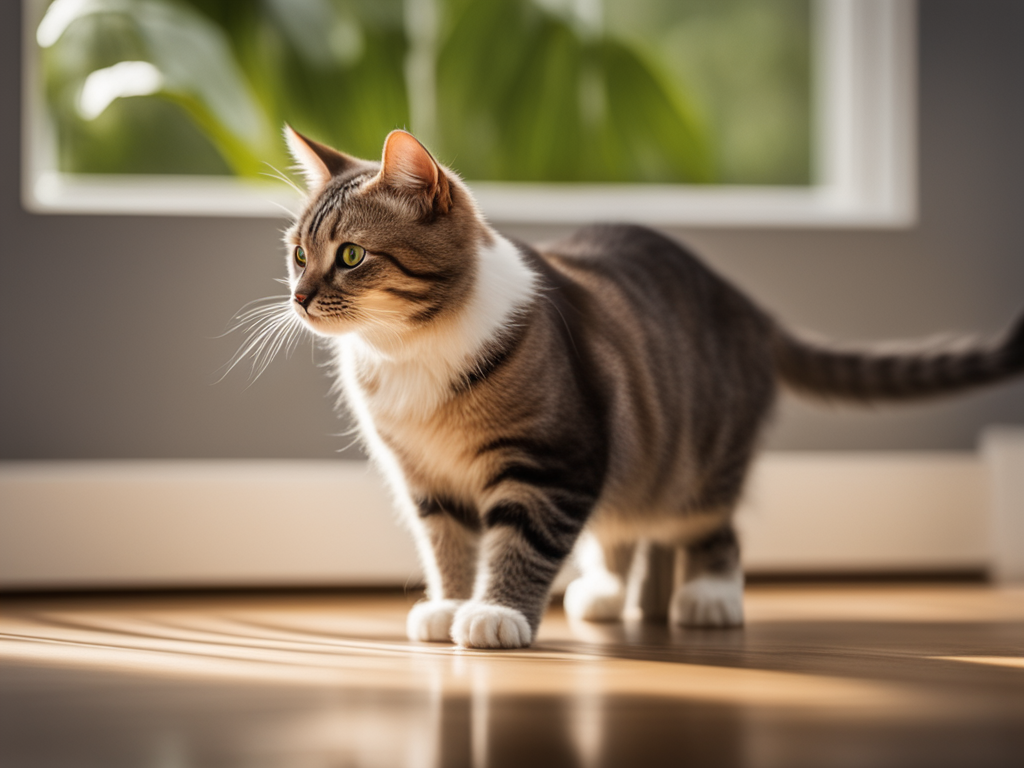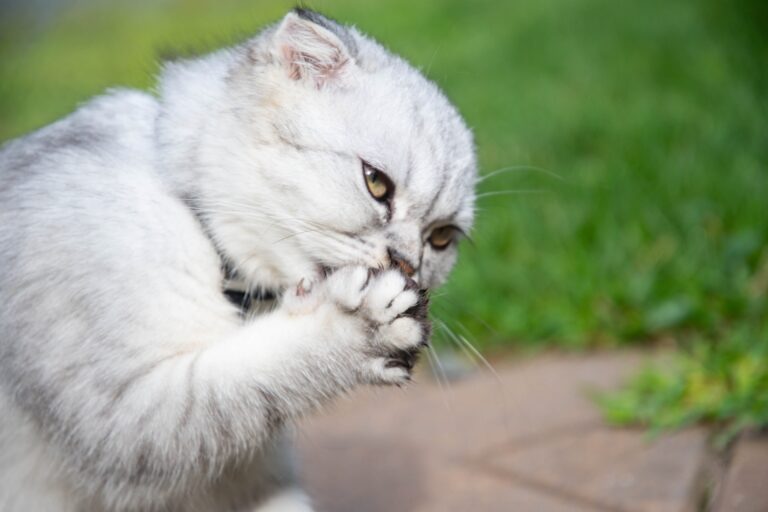How Do I Stop My Cat From Spraying Outside The Litter Box

How Do I Stop My Cat From Spraying Outside The Litter Box: Are you frustrated by your cat’s spraying behavior and wondering how to address it effectively? Dealing with this issue can be challenging, but there are practical strategies you can implement to help your feline friend overcome this habit. By understanding the underlying reasons for spraying and making some simple adjustments in your cat’s environment, you can make a positive difference in their behavior.
Understanding Cat Spraying Behavior
To understand why cats spray outside the litter box, observe their body language and environmental triggers. Cats use spraying as a form of communication, marking their territory with scent signals. Behavioral modification is key to addressing this issue. Understanding your cat’s behavior is crucial to implementing effective solutions.
Communication signals play a significant role in why cats spray. By observing your cat’s body language, you can gain insight into their emotional state and potential triggers for spraying. Common signs that a cat may spray include a raised tail, back arched, and spraying urine on vertical surfaces. These actions serve as a way for cats to communicate with other animals in the environment.
Behavioral modification techniques can help deter cats from spraying outside the litter box. Ensure your cat’s litter box is clean and accessible, as cleanliness plays a vital role in their litter box habits. Providing multiple litter boxes in different areas of the house can also reduce spraying behavior. Additionally, consider using pheromone diffusers or sprays to create a calming environment for your cat.
Identifying Triggers for Spraying
Identifying triggers for spraying in cats involves closely observing their behavior and noting environmental stimuli that may prompt this territorial marking behavior. Cats may spray due to various triggers, including stress, anxiety, changes in routine, the presence of other animals, or even certain scents. Understanding what sets off your cat’s spraying can help in implementing effective strategies to address this issue.
Behavioral therapy can be instrumental in identifying and managing triggers for spraying. Working with a professional animal behaviorist can help you decipher your cat’s behavior patterns and develop tailored interventions. Through behavioral therapy, you can learn how to modify your cat’s responses to specific triggers, reducing the likelihood of spraying outside the litter box.
Environmental modifications play a crucial role in addressing spraying triggers. Creating a calm and safe environment for your cat is key to mitigating stressors that may lead to spraying. Ensure your cat has access to quiet spaces, hiding spots, scratching posts, and perches to help them feel secure. Additionally, maintaining a clean litter box and providing multiple boxes in different locations can help prevent territorial marking.
Creating a Calm Environment
Addressing your cat’s environment is crucial in preventing spraying behavior outside the litter box. To create a calm environment that discourages spraying, consider implementing calming techniques and making adjustments to your cat’s surroundings.
Calming techniques can help reduce your cat’s stress levels, making it less likely for them to spray. One effective method is using pheromone diffusers or sprays that mimic the natural calming scents cats produce. These products can help create a sense of security and comfort for your cat, reducing the urge to mark territory.
Environmental adjustments play a significant role in preventing spraying. Ensure that your cat has a safe space where they can retreat to when feeling anxious. This area should be equipped with cozy bedding, toys, and scratching posts to promote a sense of security. Additionally, maintaining a consistent routine for feeding, playtime, and litter box cleaning can help reduce stress and anxiety in your cat.
Consider providing vertical spaces, such as cat trees or shelves, where your cat can perch and observe their surroundings. These elevated areas give cats a sense of control and security, helping to alleviate stress that may lead to spraying behavior.
Providing Sufficient Litter Boxes
To prevent spraying outside the litter box, ensure you have multiple boxes placed strategically throughout your home. Cats are particular about their litter box locations, so consider placing them in quiet, low-traffic areas. Having enough litter boxes can help reduce territorial stress and promote proper elimination habits.
Multiple Boxes Essential
Having multiple litter boxes available is crucial to preventing your cat from spraying outside the litter box. Here are some key reasons why providing multiple litter boxes is essential:
- Reduce Competition: Cats prefer having their own space to do their business, so multiple boxes can help reduce territorial issues.
- Convenience: Having more than one box ensures that your cat always has easy access to a clean litter box.
- Avoid Preference Conflicts: Some cats have specific preferences for the type of litter or box, so offering choices can prevent issues.
- Behavioral Modification: Additional boxes can aid in behavioral modification efforts, encouraging proper litter box use.
Location Matters Greatly
Choose strategic locations for your litter boxes to ensure your cat has easy access throughout the house. Place litter boxes in quiet, low-traffic areas where your cat won’t be disturbed while using them. Avoid placing them near loud appliances or in areas with high foot traffic.
For multiple-cat households, it’s crucial to have a box for each cat plus one extra to prevent territorial issues. If your cat prefers outdoor solutions, consider setting up a secure outdoor litter box in a sheltered spot. Indoor alternatives include placing litter boxes on different levels of your home if you have a multi-story house, ensuring easy access for your cat wherever they may be. By strategically situating litter boxes, you can help prevent your cat from spraying outside the litter box.
Using Pheromone Products
Consider incorporating a plug-in pheromone diffuser to help reduce your cat’s spraying behavior outside the litter box. Pheromone diffusers release synthetic versions of the natural calming pheromones that cats produce, helping to create a sense of security and reduce stress, which can be a common trigger for spraying.
To effectively use pheromone products to deter your cat from spraying outside the litter box, follow these tips:
- Placement: Position the pheromone diffuser in the room where your cat spends the most time. This could be where the spraying incidents occur or where your cat sleeps and eats.
- Consistency: Keep the pheromone diffuser plugged in continuously to maintain a constant calming effect on your cat.
- Duration: It may take a few weeks for the pheromones to have a noticeable effect on your cat’s behavior, so be patient and give it time to work.
- Combination with Other Strategies: Pheromone diffusers can be used in conjunction with other behavioral modification techniques and spray deterrents for a more comprehensive approach to stopping your cat from spraying outside the litter box.
Using pheromone products in combination with other strategies can help address the underlying reasons behind your cat’s spraying behavior and create a more comfortable environment for your feline friend.
Regular Cleaning and Maintenance
To maintain a clean and odor-free environment for your cat and discourage spraying outside the litter box, regular cleaning and maintenance are essential. Proper hygiene plays a crucial role in preventing your cat from spraying in unwanted areas. Cats are naturally clean animals, and a dirty litter box can lead to behavioral issues such as spraying. Ensure that the litter box is scooped at least once a day and completely changed regularly to provide a fresh and inviting space for your cat to use.
In addition to keeping the litter box clean, it’s important to address any accidents promptly. Clean any areas where your cat has sprayed outside the litter box thoroughly with enzymatic cleaners designed to eliminate odors. Cats have a strong sense of smell, and if they can still detect the scent of their urine, they may continue to spray in the same spot.
Regularly washing your cat’s bedding, blankets, and any other items they frequently use can also help maintain proper hygiene and prevent spraying. These items can absorb odors over time, which may trigger your cat to mark its territory. By keeping your cat’s belongings clean and fresh, you can create a more comfortable environment that reduces the likelihood of spraying.
Consulting a Veterinarian
Seek guidance from a veterinarian to address any underlying medical issues that may be contributing to your cat’s spraying behavior. It’s crucial to rule out any potential health concerns before proceeding with behavior modification strategies. Here’s why consulting a veterinarian is essential:
- Professional Evaluation: Veterinarians can conduct a thorough examination to check for any medical conditions such as urinary tract infections or other health issues that could be causing your cat to spray outside the litter box.
- Diagnostic Tests: Your veterinarian may recommend specific tests, such as blood work or urinalysis, to further investigate your cat’s health and determine if there are any underlying medical issues contributing to the spraying behavior.
- Treatment Options: If a medical problem is identified, your veterinarian can recommend appropriate medical interventions to address the issue. This may include medication, dietary changes, or other treatments to help resolve the underlying cause of your cat’s spraying behavior.
- Behavioral Advice: Veterinarians experienced in feline behavior can also provide valuable insights and recommendations for behavior modification techniques that can complement any medical intervention. This holistic approach can help address both the medical and behavioral aspects of your cat’s spraying behavior effectively.
Consulting a veterinarian is the first step in addressing your cat’s spraying behavior and ensuring they receive the necessary care and support.
Addressing Stress and Anxiety
To help your cat overcome spraying behavior, addressing stress and anxiety can be a crucial step in creating a harmonious environment for your pet. Stress management plays a significant role in a cat’s overall well-being and can directly impact their behavior, including spraying outside the litter box. Cats are sensitive animals that can easily become stressed due to changes in their environment, conflicts with other pets, or even health issues. Behavioral therapy is one effective way to address stress and anxiety in cats.
When dealing with stress-related spraying behavior, it’s essential to create a calm and safe space for your cat. Providing hiding spots, vertical spaces, and interactive toys can help reduce stress levels. Additionally, maintaining a consistent routine and feeding schedule can offer a sense of security for your feline friend.
Behavioral therapy, such as environmental enrichment and pheromone therapy, can also assist in managing stress and anxiety. Interactive play sessions, puzzle feeders, and scratching posts can help redirect your cat’s energy in a positive way. Pheromone diffusers, collars, or sprays can create a calming atmosphere and reduce spraying behavior.
In severe cases, consulting with a veterinarian or animal behaviorist may be necessary to develop a tailored stress management plan for your cat. By addressing stress and anxiety through proactive measures like stress management and behavioral therapy, you can help your cat feel more secure and reduce the likelihood of spraying outside the litter box.
Positive Reinforcement Training
When implementing positive reinforcement training with your cat, remember to reward good behavior like using the litter box correctly. Redirect negative behavior by offering alternative activities or spaces that are more appealing. Consistency and patience are key to successfully modifying your cat’s behavior through positive reinforcement training.
Reward Good Behavior
Consider using treats or praise to reinforce your cat’s good behavior of using the litter box instead of spraying outside. Positive reinforcement is a powerful tool in training your cat to exhibit desired behaviors. Here are some tips to effectively reward your cat for using the litter box:
- Clicker Training: Use a clicker to mark the moment your cat successfully uses the litter box, followed by a treat to reinforce the behavior.
- Treat Rewards: Offer your cat a small, tasty treat immediately after they use the litter box correctly.
- Consistency is Key: Reward your cat every time they use the litter box to create a strong positive association.
- Praise and Affection: In addition to treats, shower your cat with verbal praise and affection when they use the litter box correctly.
Redirect Negative Behavior
When your cat exhibits the undesired behavior of spraying outside the litter box, redirect this negative behavior through positive reinforcement training techniques. Behavior modification is key to addressing this issue effectively. Use training techniques that focus on rewarding your cat for using the litter box appropriately. For example, when your cat uses the litter box instead of spraying outside it, offer treats, praise, or playtime to reinforce this desirable behavior. Consistency is crucial in implementing these training methods. By consistently rewarding good behavior, your cat will start associating using the litter box with positive outcomes. Through patience and positive reinforcement, you can successfully modify your cat’s behavior and prevent spraying outside the litter box.
How Do I Stop My Cat From Spraying Outside The Litter Box Frequently Asked Questions
Can Neutering or Spaying My Cat Help Prevent Spraying Behavior?
Neutering or spaying your cat can help prevent spraying behavior. Behavior modification and environmental enrichment are key. Consult your vet for advice on the best approach. Providing a clean litter box and reducing stress can also help.
Are There Any Specific Breeds of Cats That Are More Prone to Spraying?
Certain cat breeds like Siamese, Burmese, and Bengals are more prone to spraying due to territorial instincts. Behavioral training can help manage this behavior. Environmental triggers and medical conditions should also be considered when addressing spraying issues.
How Can I Prevent My Cat From Spraying on Furniture or Walls?
To prevent your cat from spraying on furniture or walls, focus on behavior modification through positive reinforcement and environmental enrichment. Provide plenty of vertical space, scratching posts, and interactive toys to keep your cat mentally and physically stimulated.
Can Changing My Cat’s Diet Help Reduce Spraying Behavior?
Changing your cat’s diet can be beneficial for reducing spraying behavior. Incorporate balanced nutrition, consult with a vet for recommendations. Additionally, focus on litter box placement, cleanliness, and behavior modification techniques to address this issue effectively.
Are There Any Natural Remedies or Supplements That Can Help Stop My Cat From Spraying?
To help stop your cat from spraying, consider using aromatherapy therapy with calming essential oils like lavender. Behavior modification and training techniques can also be effective. Always consult with a vet before trying any natural remedies.
Conclusion
In conclusion, addressing your cat’s spraying behavior requires understanding the triggers, creating a calm environment, providing proper resources, and seeking assistance from a veterinarian if needed. With patience, consistency, and positive reinforcement training, you can help your cat overcome this issue and maintain a harmonious living space. Remember to be proactive in addressing any underlying stress or anxiety that may be contributing to your cat’s spraying behavior.








